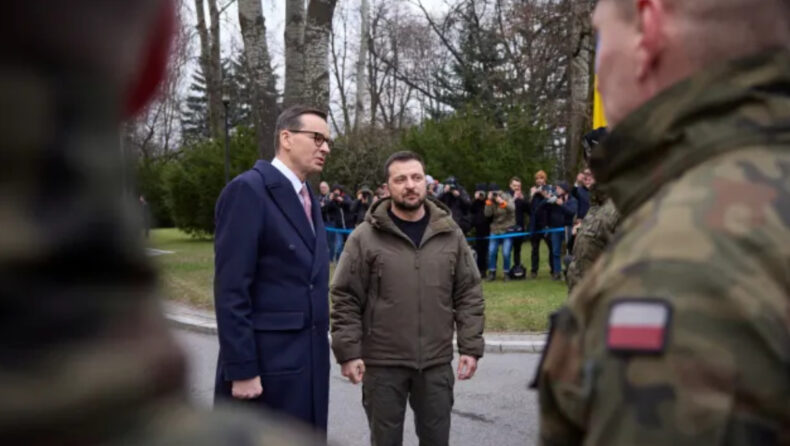Amidst the growing tension between Warsaw and Kyiv in a dispute over grain exports, Poland’s Prime Minister, Mateusz Morawiecki has announced that Poland will no longer supply weapons to Ukraine.
Poland has been one of the staunch supporters of Ukraine since the Russian invasion last year. It is also one of the primary suppliers of weapons to Poland. Furthermore, Poland is a host to about one million Ukrainian refugees.
According to this announcement, Poland will only carry out previously agreed arms deliveries to Ukraine. Mr. Morawiecki’s statement foreshadows the shift in the bilateral relations Poland shares with Ukraine.

“I’d like to let you know that Poland is just carrying out previously agreed-upon deliveries of weapons and ammunition,” government spokesperson Piotr Muller said on Thursday, according to state-run news agency PAP. “This includes the obligations arising from the agreements made with Ukraine.”
State Assets Minister Jacek Sasin commented on the statement made by Mr. Morawiecki on arms supplies, “As of this moment, it is as the prime minister said. We shall see what the future holds.”
On the row over grain imports, he said that it does not mean that Poland had ceased to back Ukraine against Russia instead Warsaw needs to replenish its own arms stockpiles.
“Polish interest comes first,” he declared. “We are unable to disarm the Polish military or remove the weaponry required to protect our security. We were really kind in this subject and made arrangements for the transfer of weaponry where we could, so we have nothing to be ashamed of in this regard,” he said.
The issue of grain export.
Tension has flared up between Warsaw and Kyiv in recent days following the news of Poland’s imposition of a ban on Ukraine’s grain imports, a move made in order to safeguard the interest of Polish farmers.
In response to the embargo, Ukraine warned Poland, as well as Hungary and Slovakia, who are all members of the European Union, that it would file a complaint with the World Trade Organization (WTO).
Poland also summoned Kyiv’s envoy to the foreign ministry in Warsaw on Wednesday following comments by Ukrainian President Volodymyr Zelenskyy about the ban on Ukraine’s grain, to which Morawiecki responded by threatening to expand the list of Ukrainian products banned from import.
Zelenskyy stated that Ukraine was fighting to safeguard land routes for grain exports at the UN General Assembly gathering in New York, but he added that the “political theatre” around grain was only beneficial to Moscow.
EU, earlier this year agreed to place restrictions on Ukrainian grain imports to Bulgaria, Hungary, Poland, Romania, and Slovakia, as a part of efforts to safeguard the interest of local farmers as cheaper Ukrainian imports were causing a slump in prices in the local markets.
Weapons supplied by Poland:

Among other weapons, Poland has supplied T-72 and Leopard tanks, armored vehicles, and howitzers to Ukraine since 24th Feb 2022. Warsaw has yet to publish a complete list of all the material it has provided.
The increasing tension:
An American diplomat who recently visited Poland refuted claims that Morawiecki’s remarks indicated waning Western support for Ukraine.
“Since we are all only human, there will be conflict from time to time… The source, who spoke on the condition of anonymity, added that this does not suggest that the alliance’s unity or even Poland’s fundamental position and will to defend Ukraine for however long it takes will change significantly.
On October 15, Poland will have parliamentary elections. The far-right has criticized the ruling nationalist Law and Justice (PiS) party for what it perceives as the government’s servile approach toward Ukraine.
In many polls, the Confederation party, which has given voice to anti-Ukrainian views, is third, and it has begun to look like it could be the decider in the election. According to analysts, PiS’s harder language toward Ukraine is a reaction to Confederation’s rising popularity.
While it’s certainly true that Poland has no additional weaponry to provide to Ukraine right now, Marek Swierczynski, a defense analyst at the think tank Polityka Insight, said Morawiecki must have realized the timing of his remarks meant they would fall “like a grenade into a cesspit.”












